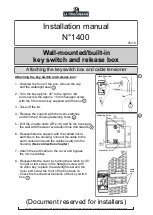
30-54
Catalyst 3560 Switch Software Configuration Guide
78-16156-01
Chapter 30 Configuring IP Unicast Routing
Configuring BGP
Use the no neighbor distribute-list command to remove the access list from the neighbor. Use the no
neighbor route-map map-tag router configuration command to remove the route map from the
neighbor.
Another method of filtering is to specify an access list filter on both incoming and outbound updates,
based on the BGP autonomous system paths. Each filter is an access list based on regular expressions.
(Refer to the “Regular Expressions” appendix in the Cisco IOS Dial Services Command Reference for
more information on forming regular expressions.) To use this method, define an autonomous system
path access list, and apply it to updates to and from particular neighbors.
Beginning in privileged EXEC mode, follow these steps to configure BGP path filtering:
Configuring Prefix Lists for BGP Filtering
You can use prefix lists as an alternative to access lists in many BGP route filtering commands, including
the neighbor distribute-list router configuration command. The advantages of using prefix lists include
performance improvements in loading and lookup of large lists, incremental update support, easier CLI
configuration, and greater flexibility.
Filtering by a prefix list involves matching the prefixes of routes with those listed in the prefix list, as
when matching access lists. When there is a match, the route is used. Whether a prefix is permitted or
denied is based upon these rules:
•
An empty prefix list permits all prefixes.
•
An implicit deny is assumed if a given prefix does not match any entries in a prefix list.
•
When multiple entries of a prefix list match a given prefix, the sequence number of a prefix list entry
identifies the entry with the lowest sequence number.
By default, sequence numbers are generated automatically and incremented in units of five. If you
disable the automatic generation of sequence numbers, you must specify the sequence number for each
entry. You can specify sequence values in any increment. If you specify increments of one, you cannot
insert additional entries into the list; if you choose very large increments, you might run out of values.
Step 6
show ip bgp neighbors
Verify the configuration.
Step 7
copy running-config startup-config
(Optional) Save your entries in the configuration file.
Command
Purpose
Command
Purpose
Step 1
configure terminal
Enter global configuration mode.
Step 2
ip as-path access-list access-list-number
{permit | deny} as-regular-expressions
Define a BGP-related access list.
Step 3
router bgp autonomous-system
Enter BGP router configuration mode.
Step 4
neighbor {ip-address | peer-group name}
filter-list {access-list-number | name} {in |
out | weight weight}
Establish a BGP filter based on an access list.
Step 5
end
Return to privileged EXEC mode.
Step 6
show ip bgp neighbors [paths
regular-expression]
Verify the configuration.
Step 7
copy running-config startup-config
(Optional) Save your entries in the configuration file.
















































